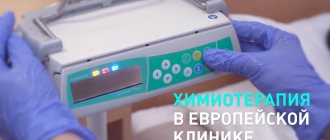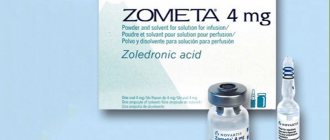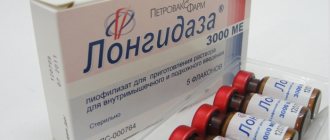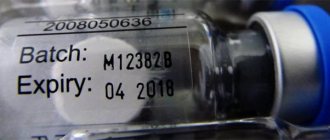Pharmacological properties of the drug Remicade
Pharmacodynamics. Infliximab is a hybrid mouse-human monoclonal antibody (IgG1) that binds with high affinity both soluble and transmembrane forms of tumor necrosis factor alpha (TNF-α), which plays an important role in the development of autoimmune and inflammatory diseases. Infliximab quickly forms stable complexes with human TNF-α, and its bioactivity decreases. Infliximab is specific to TNF-α and is not able to neutralize lymphotoxin (TNF-β). Pharmacokinetics. Single intravenous infusions of infliximab at doses of 1, 3, 5, 10 or 20 mg/kg caused a dose-proportional increase in its maximum serum concentration. The volume of distribution at steady state is independent of the administered dose and indicates that infliximab is distributed predominantly in the vascular bed. No dependence of pharmacokinetics on time was detected. The route of elimination of infliximab has not been determined. No significant differences in pharmacokinetics were detected in patients of different demographic groups, weight categories, or with mildly severe impairment of liver or kidney function. After a single dose in children and adults with Crohn's disease, no significant differences in the pharmacokinetics of the drug were identified. With a single administration of infliximab at a dose of 3, 5 and 10 mg/kg, the maximum plasma concentration was 77, 118 and 277 mcg/ml, the volume of distribution was 3 l, and the terminal half-life was 8–9.5 days. In most patients, after administration of this dose, infliximab is detected in the blood serum within 8 weeks. With a 3-fold dose of infliximab, a slight accumulation of the drug in the blood serum was observed after the second dose, which subsequently had no clinical significance. In most patients with fistula Crohn's disease, post-dose infliximab was detectable in serum for 12 weeks (range 4–28 weeks).
Composition and release form
The main component of the drug Remicade is the substance infliximab. The drug is produced only in the form of a lyophilisate (dense powder) for the preparation of a solution for injection, white, in bottles with a capacity of up to 20 ml of liquid. Each bottle contains 0.1 grams of active substance. Pack of 1 piece with instructions for use.
Manufacturer: MSD INTERNATIONAL GmbH (Singapore Branch) (Singapore or other country). Auxiliary components of the lyophilisate: sodium hydrogen phosphate and dihydrogen phosphate, sucrose, polysorbate.
Indications for use of the drug Remicade
active rheumatoid arthritis in the absence of sufficient effect from methotrexate therapy or active rheumatoid arthritis without previous methotrexate therapy for:
- reducing the severity of signs and symptoms of the disease;
- prevention of structural damage to joints (erosion and reduction of interarticular space);
- improving functional status.
Remicade is a disease-controlling antirheumatic therapy. Active ankylosing spondylitis for:
- reducing the severity of signs and symptoms of the disease;
- improving functional status.
Active psoriatic arthritis for:
- reducing the severity of signs and symptoms of arthritis;
- improving functional status;
- reducing the severity of symptoms in psoriasis in accordance with the PASI index (an index that comprehensively evaluates symptoms relative to body surface area).
Severe plaque psoriasis in adults, when systemic therapy is necessary, as well as in patients with moderate disease, when phototherapy was not effective enough, or when there are contraindications to its implementation, for:
- reducing the severity of signs and symptoms of the disease;
- improving quality of life.
Crohn's disease (moderate to severe) in children and adult patients, refractory to conventional therapy, for:
- reducing the severity of signs and symptoms of the disease;
- achieving and maintaining clinical remission;
- healing of lesions of the mucous membranes in adults;
- improving quality of life.
Taking Remicade allows you to reduce or eliminate the use of corticosteroids. Crohn's disease with fistula formation in adult patients for the purpose of:
- reducing the number of enterocutaneous and rectovaginal draining fistulas (that is, it promotes the closure of fistulas);
- maintaining the achieved effect of fistula closure;
- reducing the severity of signs and symptoms of the disease;
- improving quality of life.
Active ulcerative colitis with insufficient effectiveness of traditional therapy for:
- reducing signs and symptoms of the disease;
- induction and maintenance of clinical remission;
- induction of mucosal healing;
- improving the quality of life;
- reducing or stopping the use of GCS;
- reducing the number of hospitalizations for ulcerative colitis.
Contraindications
The use of Remicade is contraindicated:
- Patients with moderate to severe heart failure;
- In the presence of a severe infectious process, for example, tuberculosis, abscess, opportunistic infections or sepsis;
- Pregnant women;
- While breastfeeding;
- In case of hypersensitivity to any component of the drug or other mouse proteins.
As for the use of the drug in pediatrics, it can be used in the treatment of ulcerative colitis and Crohn's disease in children over 6 years of age. In all other cases, Remicade is contraindicated under 18 years of age.
Using Remicade
Treatment should be supervised by physicians experienced in diagnosing and treating the conditions for which Remicade is used. Remicade is used for intravenous administration in adult patients (≥18 years of age) and children over 6 years of age with Crohn's disease. After administration of the drug, the patient should be under medical supervision for at least 1 hour for timely identification of possible side effects. A single dose of Remicade for the treatment of rheumatoid arthritis is 3 mg/kg body weight. The drug is administered according to the schedule at weeks 0–2–6 and then every 8 weeks. To optimize clinical response, the Remicade dose may be gradually increased to 10 mg/kg body weight, or a dose of 3 mg/kg body weight may be administered at 4-week intervals. Remicade should be used concomitantly with methotrexate. The therapeutic effect, according to available data, is usually achieved within 12 weeks of treatment. If the patient has an inadequate clinical response or has lost it after this period, the dose of Remicade can be increased as described above. After achieving an adequate clinical response, treatment is continued using the selected dose or frequency of administration. The need for continued treatment should be reconsidered in patients who do not experience improvement within the first 12 weeks of therapy (or after a dose change). For the treatment of ankylosing spondylitis, Remicade is administered at a dose of 5 mg/kg body weight. The drug is administered according to the schedule at weeks 0–2–6 and then every 6–8 weeks. For the treatment of psoriatic arthritis, a single dose of Remicade is 5 mg/kg body weight. The drug is administered according to the schedule at weeks 0–2–6 and thereafter at intervals of 8 weeks. For the treatment of psoriasis, the drug is administered at a dose of 5 mg/kg body weight according to the schedule at weeks 0–2–6 and then at intervals of 8 weeks. For the treatment of severe and moderate Crohn's disease (in adults), it is recommended to administer a dose of 5 mg/kg body weight according to the schedule at weeks 0–2–6 and then maintenance therapy at intervals of 8 weeks. If the clinical response to maintenance therapy is insufficient, the dose may be increased to 10 mg/kg body weight. An alternative regimen is to administer an initial dose of 5 mg/kg body weight followed by maintenance doses of 5 mg/kg body weight when signs or symptoms of the disease reappear. However, data regarding repeated use of the drug within a 16-week interval are limited. For the treatment of Crohn's disease with the formation of fistulas (in adults), the drug is administered at a dose of 5 mg/kg body weight according to the schedule at weeks 0–2–6. If no positive clinical effect is obtained after these 3 doses, Remicade therapy should be discontinued. Continuation of treatment: additional infusions of 5 mg/kg body weight every 8 weeks or re-administration of Remicade if signs or symptoms of the disease recur - 5 mg/kg body weight every 8 weeks. In Crohn's disease, experience with re-administration of Remicade when signs or symptoms reoccur is limited; There are insufficient data comparing the benefits/risks of alternative strategies for continuing treatment. For severe and moderate Crohn's disease in children, it is recommended to administer a dose of 5 mg/kg body weight in the 0–2–6 week regimen and then maintenance therapy at intervals of 8 weeks. If the clinical response is insufficient, a decision may be made to increase the dose to 10 mg/kg body weight. Remicade should be used concomitantly with immunomodulators, including 6-mercaptopurine, azathioprine, or methotrexate. For the treatment of ulcerative colitis, the drug is administered at a dose of 5 mg/kg body weight according to the schedule at weeks 0–2–6 and then at intervals of 8 weeks. In some patients, the dose may be increased to 10 mg/kg body weight to maintain clinical response and remission. Repeated use of Remicade for Crohn's disease and rheumatoid arthritis. If the disease relapses, Remicade may be re-administered within 16 weeks after the last dose. Repeated use of alternative formulas to infliximab after 2-4 years without using the drug after the first course was accompanied by the development of delayed-type allergic reactions in 10 of 41 patients with Crohn's disease (according to clinical trials). The risk of developing these reactions between 16 weeks and 2 years is unknown. Therefore, repeated treatment at intervals of 16 weeks is not recommended. Repeated use of Remicade for ulcerative colitis. At this time, there is no data to support dosage regimens other than dosing every 8 weeks. Repeated use for ankylosing spondylitis. At this time, there is no data to support dosage regimens other than administration of the drug every 6–8 weeks. Repeated use for psoriasis and psoriatic arthritis . At this time, there is no data to support dosage regimens other than dosing every 8 weeks. Method of administration The drug is administered intravenously for at least 2 hours, at a rate of no more than 2 ml/min. The duration of infusion may be reduced to reduce the risk of infusion reactions, especially if such reactions have occurred previously. Preparation of infusion solution:
- The dose, the number of Remicade vials required (each vial contains 100 mg of infliximab) and the volume of the drug dissolved should be calculated.
- The contents of the vial are dissolved in 10 ml of water for injection using a syringe with a 21-gauge needle (diameter 0.8 mm) or smaller, directing a stream of water along the wall of the vial. Mix the solution carefully, rotating the bottle until the lyophilized powder is completely dissolved (do not shake or shake the bottle). When dissolved, foam may form, so the finished solution should stand for 5 minutes. The resulting solution should be colorless or pale yellow, opalescent. It may contain a small number of small translucent particles. Solutions containing dark particles, as well as solutions with a changed color, cannot be used.
- Bring the total volume of the prepared dose of Remicade solution to 250 ml by adding 0.9% sodium chloride solution for injection. To do this, remove a volume equal to the volume of the prepared Remicade solution (in water for injection) from a glass bottle or infusion bag that contains 250 ml of 0.9% sodium chloride solution. After this, the previously prepared Remicade solution is slowly added to a bottle or infusion bag with the required volume of 0.9% sodium chloride solution and mixed carefully.
- Due to the fact that the drug does not contain a preservative, it is recommended to administer the infusion solution immediately (no later than 3 hours after preparation). If dissolution and dilution were carried out under strict aseptic conditions, the solution can be used for 24 hours if stored at a temperature of 2–8 °C. Do not save any unused remainder of the drug for future use.
- Remicade should not be administered in combination with other drugs through the same infusion system.
- The infusion solution must be visually checked before administration.
- If there are opaque particles, foreign inclusions or discolored, it cannot be used.
- Unused infusion solution is not subject to further use.
Side effects of Remicade
In clinical trials of infliximab, side effects were observed in 60% of patients receiving the drug and in 40% of patients receiving placebo. The table shows the likely side effects, both common (frequency 1/100, but ≤1/10), and infrequent (frequency 1/1000, but ≤1/100) and rare (1/10,000 and ≤1/1000) side effects effects. The frequency of adverse reactions was determined by comparing data when using placebo. Most of them were mild or moderate and related to the respiratory system, skin and its appendages. The most common side effects requiring discontinuation of therapy were infusion-related reactions: shortness of breath, urticaria, headache. Side effects identified in clinical studies
Organs and systems | Response frequency | Nature of the reaction |
| Violation of the body's resistance mechanisms | Often Infrequently | Viral infection (flu, herpes) Abscess, cellulitis, candidiasis, septic bacterial infection, tuberculosis, fungal infection, eye stye |
| Immune disorders | Often Infrequently | Reactions resembling serum sickness Lupus-like syndrome, allergic reactions from the respiratory tract, anaphylactic reactions |
| Blood and lymphatic system | Infrequently | Anemia, leukopenia, lymphadenopathy, lymphocytosis, lymphopenia, neutropenia, thrombocytopenia |
| Mental disorders | Infrequently | Depression, psychosis, anxiety, amnesia, apathy, nervousness, drowsiness, insomnia |
| Nervous system disorders | Often Uncommon Rarely | Headache, dizziness Exacerbation of demyelinating diseases (multiple sclerosis) Meningitis |
| From the side of the organ of vision | Infrequently | Conjunctivitis, keratoconjunctivitis, endophthalmitis, periorbital edema |
| From the cardiovascular system | Often Uncommon Rarely | Hot flashes Syncope, bradycardia, palpitations, cyanosis, arrhythmia, progression of heart failure*, ecchymoses/hematomas, hypertension, hypotension, collapse, petechiae, thrombophlebitis, vasospasm, peripheral circulatory disorders Circulatory failure, tachycardia |
| From the respiratory system | Often Uncommon Rarely | Upper respiratory tract infections, bronchitis and pneumonia, shortness of breath, sinusitis Nosebleeds, bronchospasm, pleurisy, allergic manifestations, pulmonary edema Pleural exudate |
| From the gastrointestinal tract | Often Uncommon Rarely | Nausea, diarrhea, abdominal pain, dyspepsia Constipation, gastroesophageal reflux, cheilitis, diverticulitis Intestinal perforation, intestinal stenosis, gastrointestinal bleeding |
| From the hepatobiliary system | Uncommon Rarely | Liver dysfunction, cholecystitis, hepatitis |
| From the skin and its appendages | Often Infrequently | Skin rash, itching, urticaria, sweating, dry skin Fungal dermatitis (onychomycosis), eczema/seborrhea, stye, bullous rash, furunculosis, periorbital edema, hyperkeratosis, skin pigmentation disorders, alopecia, rosacea, warts |
| From the musculoskeletal system | Infrequently | Myalgia, arthralgia, back pain |
| From the urinary system | Infrequently | Urinary tract infections, pyelonephritis |
| Body as a whole | Often Infrequently | Fatigue, chest pain, infusion reactions, fever Injection site reactions, swelling, pain, chills, delayed healing rangranulomatous lesions |
| Based on laboratory data | Often Rarely | Increased levels of liver transaminases Formation of antibodies, changes in complement factor |
| Reproductive system disorders | Infrequently | Vaginitis |
*Data obtained from early phase studies of the drug in patients with congestive heart failure.
Children. In general, side effects in children with Crohn's disease receiving infliximab were comparable in frequency and nature of side effects to adult patients. Adverse events that occurred more frequently in children compared to adult patients with Crohn's disease receiving the same treatment regimen in clinical trials were: anemia (10.7%), blood in the stool (9.7%), leukopenia (8.7). %), hyperemia (8.7%), viral infection (7.8%), neutropenia (6.8%), bone fractures (6.8%), bacterial infection (5.8%) and allergic reactions from respiratory system (5.8%). 17.5% of patients randomized in the clinical trial experienced one or more infusion-related reactions, with 17 and 18% of patients at 8 and 12 weeks of maintenance therapy, respectively. No serious infusion reactions were noted. Antibodies to infliximab were formed in 3% of children. During clinical trials, infections were reported in 56.3% of pediatric and 50.4% of adult patients with Crohn's disease. The most common infections reported were upper respiratory tract infections and pharyngitis, with abscess being the most serious. Serious (sometimes fatal) infections, including opportunistic infections and tuberculosis, were more frequently reported in children; infusion reactions and hypersensitivity reactions. There have been reports of the development of malignant neoplasms in children, transient changes in the activity of liver enzymes, lupus-like syndrome and the appearance of antibodies. A rare type of hepatolienal T-cell lymphoma has also been reported to develop in adolescents and young adults with Crohn's disease using Remicade. Adverse reactions in children with juvenile rheumatoid arthritis (JRA) . The safety and effectiveness of Remicade® in children aged 4–17 years with JRA was assessed in a multicenter, randomized, placebo-controlled, double-blind study lasting 14 weeks, followed by an extension to 44 weeks (double-blind control, active treatment). About the development of infusion reactions, delayed allergic reactions, the formation of antibodies to infliximab, the development of diseases of microbial etiology (see SPECIAL INSTRUCTIONS).
Negative reactions
- viral infections, which include influenza and herpes;
- bacterial infections (abscess, sepsis);
- meningitis;
- Hodgkin's lymphoma (malignant disease of the lymphatic system);
- benign and malignant tumors;
- neutropenia (abnormally low levels of neutrophils);
- decrease in the number of leukocytes, red blood cells, granulocytes and hemoglobin in the blood;
- various allergic reactions, anaphylactic shock;
- dizziness;
- convulsions;
- neuropathy (damage to peripheral nerves);
- pain in the chest;
- chills;
- swelling;
- infectious inflammation at the injection site, worsening healing of existing injuries.
Also, all negative reactions can be divided in relation to the organs that they affect:
- eyes: conjunctivitis, keratitis, styes, vision loss develop;
- heart: increased heart rate, cardiac arrhythmia;
- vascular system: increase or decrease in blood pressure, ischemia, the appearance of hematomas, thrombophlebitis, vasospasm;
- respiratory system: inflammation of the sinuses, bronchi, development of bronchospasm, pulmonary edema, pleurisy;
- digestion: stomach pain, nausea, diarrhea, narrowing of the intestinal lumen, inflammation of the pancreas;
- skin: psoriasis, itching, excessive sweating;
- muscles: pain and inflammation of muscle tissue;
- reproductive system: vaginitis.
Special instructions for the use of Remicade
Infusion reactions and hypersensitivity. Infliximab may cause acute infusion-related reactions and delayed allergic reactions. The development time of these reactions varies. Therefore, all patients receiving Remicade should be observed for at least 1 hour after infusion. Acute infusion reactions may develop immediately or within several hours after administration. If an acute infusion reaction occurs, administration should be stopped immediately. Some of these effects have been described as anaphylaxis. Emergency equipment and medications should be available for infusion reactions (e.g. paracetamol, antihistamines, corticosteroids, epinephrine and/or paracetamol). To prevent reactions (mild or transient), the patient can be given an antihistamine, hydrocortisone and/or paracetamol before starting the infusion. Some patients may develop antibodies to infliximab, which increases the frequency of infusion reactions and, in some cases, causes the development of severe allergic reactions. In patients with Crohn's disease, there was an association between the formation of antibodies to infliximab and a decrease in the duration of clinical response to treatment. The simultaneous use of immunomodulators reduces the formation of antibodies and reduces the frequency of infusion reactions. The effect of concomitant use of immunosuppressives was greater in patients treated episodically than in patients treated with maintenance therapy. Patients not receiving immunosuppressive medications during Remicade therapy are at a potentially high risk of developing antibodies. These antibodies are not always detected in blood serum. If severe reactions develop, symptomatic therapy should be prescribed and Remicade should be discontinued. Delayed-type hypersensitivity reactions have been observed with a high frequency (25%) in Crohn's disease after re-administration 2-4 years after the last administration of Remicade. They were characterized by the development of myalgia and/or arthralgia with fever and/or rash within 12 days from the start of re-therapy. Some patients also developed itching, swelling of the face, lips, dysphagia, rash such as urticaria, pharyngitis, and headache; in some cases these manifestations were similar to those of serum sickness. Patients should be warned about the possibility of developing such reactions. When prescribing re-treatment after a long period, the patient should be under constant observation due to the possibility of delayed-type hypersensitivity reactions. Infections. TNF-α is a mediator of inflammation and a modulator of cellular immunity. Experimental data indicate the need for TNF-α to participate in the fight against intracellular infections. Clinical experience has shown an impaired immune response to infections in some patients receiving infliximab. Remicade should be used with caution when treating patients with a history of chronic or recurrent infections, as well as when using immunosuppressive drugs simultaneously. Cases of opportunistic infections, including tuberculosis and other infections, including sepsis and pneumonia, have been reported during treatment with infliximab. Before starting Remicade therapy, the patient should be thoroughly examined to exclude tuberculosis, including latent tuberculosis. The examination should include a thorough medical history, including information about a history of tuberculosis, probable contacts with tuberculosis patients, and previous or concomitant immunosuppressive therapy. It is mandatory for all patients to undergo a tuberculin skin test and chest x-ray before starting therapy. It must be taken into account that in seriously ill patients and in patients with a compromised immune system, a pseudo-negative tuberculin test can be obtained. Patients with overt infections and/or abscesses should be adequately treated before initiating Remicade therapy. Treatment should not be given if active tuberculosis is diagnosed. In the case of latent tuberculosis, specific anti-tuberculosis treatment must be carried out before starting Remicade therapy. Patients should be monitored by a physician during and after Remicade therapy to rule out infections, including milliary tuberculosis. Inhibition of TNF-α may also mask symptoms of infection such as fever. Treatment with Remicade should be interrupted if the patient develops severe infection or sepsis. Since elimination of infliximab can occur over a period of 6 months, the patient should be under medical supervision throughout this period. In patients with Crohn's disease with acute suppuration of fistulas, Remicade therapy should not be started until the source of infection, including an abscess, has been excluded or eliminated. The safety of surgical interventions during Remicade therapy has not been sufficiently studied. Patients who require surgery should be evaluated to rule out infections. All patients should be warned to consult a physician if signs/symptoms consistent with tuberculosis (eg, persistent cough, weight loss, low-grade fever) occur during or after treatment with Remicade. Concomitant use of a TNF-α inhibitor and anakinra. Serious infections were observed during clinical trials with concomitant use of anakinra (a recombinant non-glycosylated form of the interleukin-1 receptor antagonist) and etanercept (a TNF-α inhibitor), which had no therapeutic benefit compared with etanercept monotherapy. Based on the nature of the adverse events observed during combination treatment with etanercept and anakinra, such toxicity may result from the combination of anakinra and another TNF-α inhibitor. Therefore, the combination of Remicade and anakinra is not recommended. Vaccination. There are no data regarding the safety and effectiveness of vaccination with live vaccines in patients receiving anti-TNF therapy. Therefore, it is recommended to refrain from simultaneous vaccination with live vaccines. Autoimmune processes. The relative deficiency of TNF-α caused by anti-TNF therapy may initiate the development of an autoimmune process in genetically predisposed patients. If the patient develops symptoms resembling lupus syndrome, and at the same time antibodies to double-stranded DNA are detected, treatment should be stopped. Neurological effects. When using infliximab and other TNF-α inhibitors, isolated cases of optic neuritis, seizures, the appearance or exacerbation of clinical symptoms and/or radiographic signs of demyelinating diseases, including multiple sclerosis, were observed. A careful assessment of the benefits/risks of treatment with Remicade in patients with existing demyelinating diseases of the central nervous system is recommended. Lymphomas. In controlled clinical trials of TNF-blocking agents, more cases of lymphoma were observed among patients receiving a TNF-blocking agent than among control patients. During clinical trials with Remicade in patients with rheumatoid arthritis, Crohn's disease, psoriatic arthritis, ankylosing spondylitis, and ulcerative colitis, the incidence of lymphoma in patients receiving Remicade was reported to be higher than in the general population (although the overall incidence was rare) . Patients with Crohn's disease or rheumatoid arthritis, especially those with high disease activity and/or patients chronically taking immunosuppressive therapy, may be at increased risk (several times that of the general population) for developing lymphoma, even in the absence of TNF-blocking therapy. therapy. In a clinical study evaluating the use of Remicade in patients with moderate to severe COPD, a higher incidence of malignancies was reported in patients receiving Remicade compared to control patients. All patients, according to their medical history, were heavy smokers. The potential significance of TNF-blocking therapy in the development of malignancies is unknown. Therefore, caution should be exercised when deciding to use TNF-blocking therapy in patients with a history of malignancy or when deciding to continue therapy in patients who have developed malignancy. Heart failure. Remicade is used with caution in the treatment of patients with mild heart failure (NYHA I/II). Changes in the hepatobiliary system. In post-marketing studies, very rare cases of jaundice and non-infectious hepatitis, sometimes with signs of autoimmune hepatitis, have been observed. There have been isolated cases of liver failure resulting in liver transplantation or death. A causal relationship between the use of Remicade and the development of these phenomena has not been established. Patients with symptoms or signs of hepatic dysfunction should be evaluated for liver damage. If bilirubin and/or ALT levels increase to more than 5 times the upper limit of normal, Remicade should be discontinued and changes detected should be carefully assessed. As with the use of other immunosuppressive drugs, reactivation of hepatitis B occurred during treatment with Remicade in patients who were chronic carriers of this virus (for example, HBsAg-positive). Therefore, chronic carriers of the hepatitis B virus should be observed and monitored before and during treatment with Remicade. Anemia in patients with rheumatoid arthritis. There is a possibility that TNFα plays a role in the inhibition of erythropoiesis in patients with chronic inflammatory diseases. In clinical trials, 39.8% of patients with rheumatoid arthritis whose baseline hemoglobin level was ≤120 g/L experienced an increase of ≥10 g/L at week 22 of treatment with infliximab and methotrexate, compared with 19.3% of patients who received methotrexate monotherapy. In 12.1% of patients treated with infliximab and methotrexate, hemoglobin levels increased by ≥20 g/l versus 4.5% of patients using methotrexate. Significant improvement was also observed in patients with initial hemoglobin levels ≤100 g/L. Analysis of clinical data showed that infliximab therapy has a positive effect on the course of anemia in patients with rheumatoid arthritis, regardless of its effect on ACR20 response (American College of Rheumatology criteria). It was shown that among ACR20 responder patients, therapy with infliximab and methotrexate had a significantly better effect on the course of anemia than therapy with methotrexate alone. Increases in hemoglobin levels were associated with improvements in functional status and quality of life at 22 weeks of treatment. Hepatolienal T-cell lymphoma. In post-marketing experience, the development of hepatolienal T-cell lymphoma has been rarely reported in adolescents and young adults with Crohn's disease using Remicade. This rare type of T-cell lymphoma is very aggressive and usually fatal. The above cases occurred in patients using Remicade® in combination with azathioprine or 6-mercaptopurine. Cases of hepatolienal T-cell lymphoma have also been reported in patients with Crohn's disease who used azathioprine and did not use Remicade®. No cases of hepatolienal T-cell lymphoma have been reported in patients who received Remicade® alone. The causal relationship between the development of hepatolienal T-cell lymphoma and Remicade® therapy remains unclear. Use for the treatment of elderly patients. There were no significant differences in the pharmacokinetics of the drug in elderly people (65–80 years) with rheumatoid arthritis. Specific studies regarding the treatment of Remicade in persons with Crohn's disease, as well as in persons with liver and kidney diseases, have not been conducted. Use in children . Remicade is used to reduce signs and symptoms of the disease and to induce and maintain clinical remission in children with moderate to severe active Crohn's disease. It should be kept in mind that all pediatric patients in phase III clinical trials required a constant dose of 6-mercaptopurine, or azathioprine, or methotrexate. A pharmacokinetic study was conducted in children aged 11–17 years with Crohn's disease. No significant differences in pharmacokinetics were found with a single dose of the drug in children and adults with Crohn's disease. Remicade has not been studied in children under 6 years of age with Crohn's disease. The safety and effectiveness of Remicade in patients with juvenile rheumatoid arthritis have not been established. Use during pregnancy and lactation. It is unknown whether Remicade has adverse effects on the fetus when used during pregnancy, so it is not recommended to use Remicade during this period unless absolutely necessary. Pregnancy should be avoided by using appropriate contraception during treatment and for at least 6 months after the last Remicade infusion. It is unknown whether infliximab is excreted into breast milk. It is therefore recommended that you stop breastfeeding during and after treatment with Remicade. Breastfeeding is allowed no earlier than 6 months after completion of treatment (taking into account the importance of therapy for the mother). studies have been conducted regarding the effect on the ability to drive vehicles and operate complex equipment . Patients should refrain from driving or operating machinery if they experience increased fatigue during treatment with Remicade.






